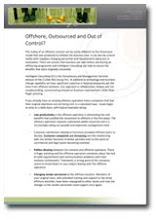In its recent manifesto, ‘Accessing Professional Talent in a Global Market’, APSCo calls for a number of what I consider to be ‘common sense’ solutions, which could significantly shape the future jobs market.
The professional body has recommended measures including a call for a junior minister to be appointed with remit over flexible employment and engagement within the Department of Business, Innovation and Skills, and the creation of a European policy that defends the UK’s flexible market. Both of these are desperately needed if we are to ensure that the UK is able to thrive with both its internal employment policy as well as when it comes to recruiting overseas.
However the main issue, which I feel is most prevalent for the next Government to consider, is the need for a new regulatory framework that ensures there is a clear and legal distinction between groups of highly-paid, skilled professionals and those who are lower paid and can find themselves in vulnerable positions. This can, as APSCo put it, often be because they are being forced to identify as ‘self-employed by circumstance, or by unscrupulous end-clients, or intermediaries’. APSCo would like to see this distinction reflected in a move away from the ‘one-size-fits-all’ approach which has been a feature of regulation in the staffing industry for the past 14 years.
They suggest that diversity should be recognised and reflected by regulations, and that the Government seeks to understand who is willingly self employed, and who is being coerced or forced into it.
While this has traditionally been seen as a tricky thing to gauge, differentiators for this could include measuring salary levels, skill sets and the amount of control someone has over which work they take and how they deliver it. For example, an individual earning a relatively high salary compared to the national average, is not vulnerable to exploitation.
It’s heartening to see an organisation take the opportunity of the Election offers to address these often complex and thorny issues, and press for action. These comparatively simple steps could make the working lives for everyone better, and in turn benefit the economy and business in general.







No comments:
Post a Comment